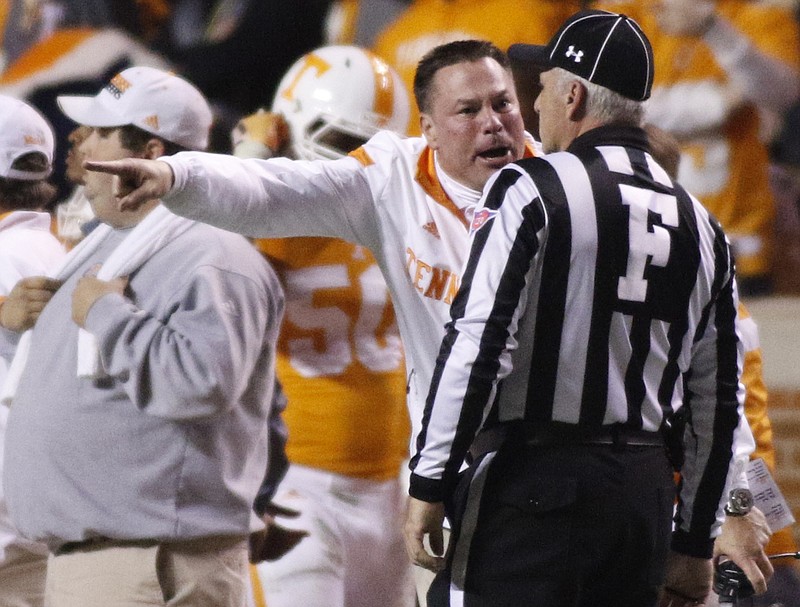KNOXVILLE -- The number escaped Dave Hart. Tennessee's fourth-year athletic director was unable to recall how much money his football coach made when he first broke into the AD ranks at East Carolina in 1987.
One thing is certain, though: It's probably a much lower figure than what he's paying his current football coach.
"Certainly that marketplace has shifted dramatically," Hart said in his office on Thursday morning, exactly one month after he announced that Butch Jones, the third-year coach of the Volunteers, had received a contract extension and a $650,000 raise that bumped his annual salary to $3.6 million.
You don't have to go back to the 1980s to see the shift, either.
Read more
Huesman, UTC assistants rewarded
According to USA Today's annual database for coaching salaries, 11 coaches made more than $4 million in 2014, including four -- Alabama's Nick Saban, Texas A&M's Kevin Sumlin, LSU's Les Miles and South Carolina's Steve Spurrier -- in the Southeastern Conference.
Ole Miss made Hugh Freeze the league's fifth $4 million coach when it gave him a raise of more than $1 million to give him an annual salary of $4.3 million.
Urban Meyer, then at Florida, was the only SEC coach to command a $4 million salary just five years ago in 2009.
Every coach in the SEC, regarded as college football's top league, now makes more than $3 million after Jones received his raise, Kentucky gave Mark Stoops a midseason raise to $3.25 million and Florida handed Colorado State coach Jim McElwain a compensation package reportedly averaging $3.5 million.
In 2009, only four SEC coaches -- Meyer, Saban, Miles and Georgia's Mark Richt -- were making more than $3 million.
The salary spike coincided with the SEC's increased revenue. For the 2013-14 fiscal year, the conference distributed $309.6 million -- that's nearly $21 million per school -- in revenue. Five years ago, that number was just $165.9 million.
That influx of money has created an arms race of sorts throughout college football, from the SEC big boys to UT Chattanooga in the Football Championship Subdivision, in terms of salaries and facility upgrades.
"It started with the big-time programs in the FBS years ago as far as coaching salaries and facilities, and now it has trickled down to the FBS teams," said UTC athletic director David Blackburn, who spent two decades in various roles in Tennessee's athletic department.
"It's on a smaller scale for us, but we're at that point now where we know teams we compete with have facilities that are used to bringing in even more good players. You can't afford to fall behind because recruits nowadays notice every little thing, and when you see one program has something new and you don't, that'll get used against you as falling behind."
Even after his raise, Jones is just the seventh-highest-paid coach in the SEC, and his staff's salary for 2014 -- $3.265 million according to USA Today -- ranked seventh in the league and 16th nationally.
Former Tennessee coach Phillip Fulmer made $2.4 million in his final season with the Vols in 2008, Lane Kiffin's salary for his lone season in Knoxville was $2 million and Derek Dooley made $2 million in his final season in 2012.
Jones' initial deal with Tennessee, whose athletic department is operating on a budget of more than $104 million for this fiscal year, paid him $2.95 million.
"It's a market-driven element of our industry," Hart said. "It's certainly market-driven, not that our entire country isn't that way, but we've seen a spike not only with head coaches, but certainly with assistant coaches."
Five coordinators, according to USA Today, made more than $1 million in 2014, and Auburn reportedly will pay former Florida coach Will Muschamp between $1.6 and $1.8 million to be its defensive coordinator.
Former Tennessee defensive coordinator John Chavis, recently hired by Texas A&M, had a $1.3 million salary at LSU this year after starting out at less than $500,000 with the Tigers in 2009 and making $340,000 in his final season with the Vols.
Tennessee paid its nine assistant coaches $1.935 million in 2008.
Bruce Hutchison, a UTC economics professor, said he agreed strongly with Hart's assertion that the rising salaries across college football are market-driven
"That amount of money is astronomical to most of us," Hutchison said, "but there are public and private universities gladly agreeing to pay those salaries because it's what the market bears for people who are successful or are perceived to be successful. And you have read the articles and seen the fans, they seem to be very happy with the progress Butch has made.
"(The money) is mind-boggling, but even if you look at it casually, these guys have proven to be very successful and almost all of them are workaholics. I would argue that their first, second and third priorities are their jobs as head football coaches."
As for the coaching salaries, there doesn't appear to be any ceiling to the rising figures.
"I don't think anybody can ever forecast," Hart said. "When you get into marketplaces, it's hard to forecast where various markets might go.
"I've said this many times as well, that Butch is not only the face of our athletics program. He's the face of our university, and that's true of many head football coaches. He represents us extraordinarily well."
Contact Patrick Brown at pbrown@timesfreepress.com.
